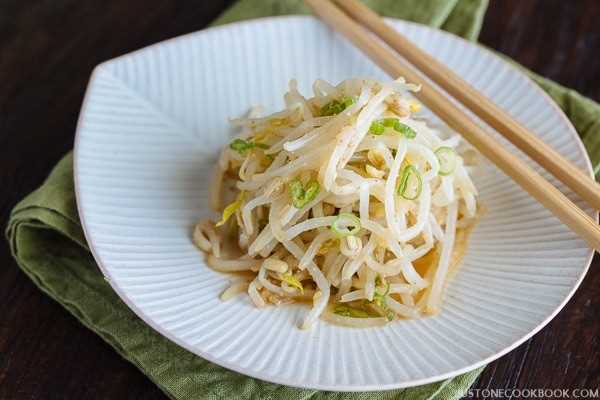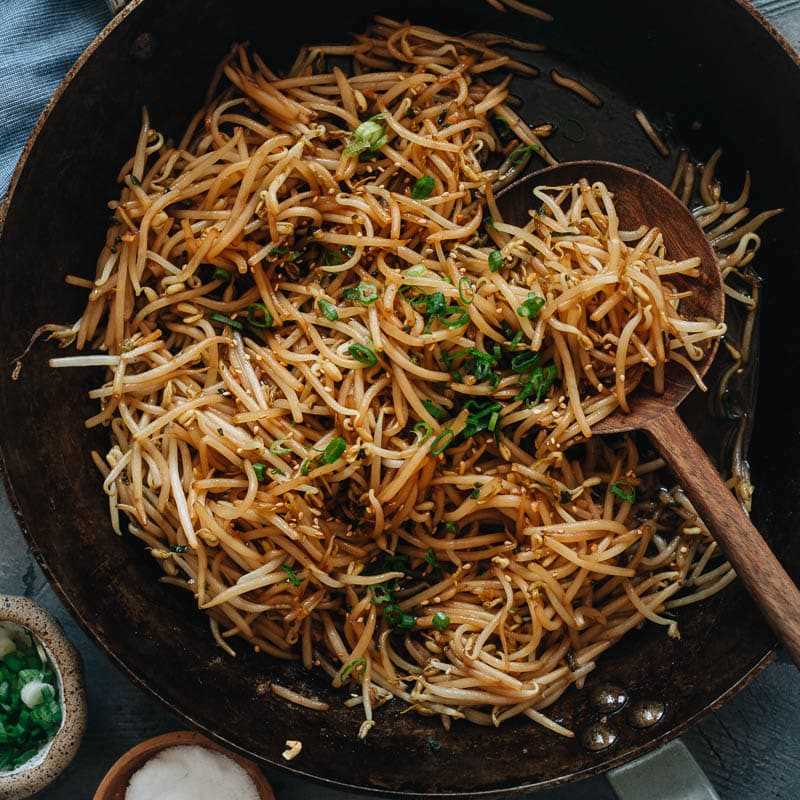



Bean sprouts are a popular ingredient in many Asian cuisines and are commonly used in salads, stir-fries, and soups. But do you really need to cook them before consuming?
The answer is: it depends. While bean sprouts can be eaten raw, many people prefer to cook them for various reasons. Cooking bean sprouts can help enhance their flavor and texture, making them more enjoyable to eat. Additionally, cooking can also help reduce the risk of foodborne illnesses that may be present in raw sprouts.
When cooking bean sprouts, there are several methods you can choose from:
Stir-frying: This is a popular method that involves quickly cooking the sprouts in a hot pan with some oil. Stir-frying can help retain the crunchiness of the sprouts while adding a nice charred flavor.
Must-HaveT.y Ling Stir Fry Bean Sprouts PackEnhances flavors in any recipe easilyThis pack of stir fry bean sprouts is perfect for adding depth and flavor to your cooking. Ready-to-use, these bean sprouts allow for quick meal preparation without compromising on quality.Boiling: Boiling bean sprouts is a simple and quick method that can help soften them slightly. This method is often used in soups or as a blanching step before using them in other dishes.
Steaming: Steaming bean sprouts can help them retain their crunchiness while also giving them a more delicate and tender texture. This method is often used in dishes like spring rolls or as a side dish.
In conclusion, while bean sprouts can be consumed raw, cooking them can enhance their flavor, texture, and safety. Whether you choose to cook them or not ultimately depends on your personal preferences and the specific dish you are preparing.
Benefits of Cooking Bean Sprouts
Bean sprouts are a nutritious and delicious ingredient that can be enjoyed in various dishes. Cooking bean sprouts can enhance their flavor and texture, and also provide several health benefits.
Nutritional Value
Bean sprouts are packed with essential nutrients such as vitamins, minerals, and fiber. Cooking bean sprouts helps to unlock these nutrients, making them more accessible for your body to absorb.
Vitamins: Bean sprouts contain vitamins A, C, and K, which are important for maintaining a healthy immune system, promoting collagen production, and supporting bone health.
Minerals: Cooking bean sprouts helps to release minerals such as calcium, iron, and magnesium. These minerals are vital for maintaining strong bones and teeth, carrying oxygen throughout the body, and supporting muscle function.
Fiber: Bean sprouts are an excellent source of dietary fiber, which aids digestion and helps prevent constipation. Cooking bean sprouts can soften the fiber, making it easier for your body to digest and absorb.
Improved Digestion
Cooking bean sprouts can improve their digestibility and minimize the risk of foodborne illnesses. Raw bean sprouts have the potential to harbor bacteria, so cooking them thoroughly can kill any harmful microorganisms, making them safer to consume.
Additionally, the cooking process can break down complex carbohydrates in bean sprouts, making them easier to digest. This can be beneficial for those with sensitive digestive systems or digestive disorders.
Increase Antioxidant Activity

Cooking bean sprouts can help increase their antioxidant activity. Antioxidants are compounds that help protect the cells in your body from damage caused by free radicals. The cooking process can enhance the availability of these beneficial compounds, allowing you to reap their full benefits.
Note: Overcooking bean sprouts can result in a loss of some of these nutrients, so it’s best to cook them until they are just tender.
In conclusion, cooking bean sprouts can enhance their nutritional value, improve digestion, and increase antioxidant activity. By incorporating cooked bean sprouts into your diet, you can enjoy these benefits while adding a flavorful and healthy ingredient to your meals.
Boosts Nutritional Value
Cooking bean sprouts can actually increase their nutritional value. While raw bean sprouts are already rich in vitamins and minerals, cooking them can make these nutrients more easily digestible and bioavailable.
Cooking bean sprouts can also help to eliminate any potential bacteria or foodborne pathogens that may be present. Sprouts are often associated with foodborne illness outbreaks, so it’s important to take proper precautions when consuming them raw.
When cooking bean sprouts, it’s best to lightly steam or blanch them to retain as much of their nutritional value as possible. This cooking method helps to preserve the vitamins and minerals while also enhancing their taste and texture.
Overall, cooking bean sprouts can be a healthy and delicious addition to your meals, offering a boost in nutritional value and a reduced risk of foodborne illness. So go ahead and incorporate these nutrient-packed sprouts into your cooking repertoire!
Enhances Digestibility
Bean sprouts offer various benefits for digestion. When you cook bean sprouts, their fiber content becomes more soluble, which makes them easier to digest. Fiber is essential for maintaining a healthy digestive system, as it adds bulk to the stool and promotes regular bowel movements, reducing the likelihood of constipation.
Moreover, cooking bean sprouts can help break down complex carbohydrates, such as raffinose and stachyose, which are found in raw sprouts and can cause gas and bloating in some individuals. The cooking process breaks down these complex sugars, making bean sprouts easier to digest and reducing the chances of digestive discomfort.
Additionally, cooking bean sprouts can deactivate certain enzymes that can hinder proper digestion. For example, raw bean sprouts contain trypsin inhibitors, which can interfere with the breakdown of proteins. Cooking them neutralizes these inhibitors, allowing for better protein digestion.
Overall, cooking bean sprouts enhances their digestibility by increasing fiber solubility, breaking down complex carbohydrates, and deactivating enzymes that can hinder digestion. Incorporating cooked bean sprouts into your meals can support a healthy digestive system and reduce the chances of digestive discomfort.
Increase Safety
When you cook bean sprouts, you are taking steps to increase safety in your kitchen. Bean sprouts, like any other raw vegetable, can harbor bacteria such as E. coli and salmonella. By cooking bean sprouts, you can kill any harmful bacteria and reduce the risk of foodborne illnesses.
Cooking bean sprouts can also help prevent cross-contamination. If you use the same cutting board or knife that you used for raw meat or other high-risk foods, cooking bean sprouts can help eliminate any potential contamination.
In addition, cooking bean sprouts can help improve digestion. Raw bean sprouts can be difficult for some people to digest, causing bloating and discomfort. By lightly cooking them, you can make them easier on your digestive system.
Overall, cooking bean sprouts is a simple and effective way to increase safety in your kitchen and protect your health.
Adds Flavor to Dishes
Bean sprouts are not only a nutritious addition to meals, but they also add a punch of flavor to dishes. Their mild and slightly sweet taste pairs well with a variety of ingredients, making them a versatile ingredient in many cuisines.
Whether you’re stir-frying vegetables, making a salad, or adding them to soup, bean sprouts can elevate the taste of your dish. They provide a refreshing crunch and a subtle earthy flavor that enhances the overall experience.
Furthermore, bean sprouts absorb the flavors of other ingredients in a dish, allowing them to blend harmoniously and create a balanced taste. Their ability to complement different flavors makes them a popular choice for both vegetarian and meat-based meals.
So why not start incorporating bean sprouts into your cooking? Not only will you be adding a burst of flavor to your dishes, but you’ll also be benefiting from their nutritional value. Give them a try and discover the delightful taste they bring to your meals.
Expands Culinary Options
Bean sprouts are a versatile ingredient that can expand your culinary options and add a unique texture and flavor to your dishes. These sprouts can be used in a variety of recipes, including stir-fries, salads, soups, and sandwiches.
When added to stir-fries, bean sprouts provide a refreshing crunch and a slightly sweet taste. They can be stir-fried alongside other vegetables and proteins, or simply added at the end for a crisp and fresh texture. Bean sprouts can also be used as a topping for salads, adding a fresh and crunchy element. In soups, they can provide a light and delicate texture, complementing the flavors of the broth.
Bean sprouts are also a great addition to sandwiches and wraps, providing a satisfying crunch and a unique flavor. They can be used in place of lettuce or combined with other vegetables to create a flavorful and nutritious filling.
Health Benefits
In addition to their culinary versatility, bean sprouts also offer several health benefits. They are low in calories and fat, making them a great option for those watching their weight. Bean sprouts are also a good source of vitamins C and K, as well as folate, iron, and fiber. These nutrients can support immune function, promote healthy digestion, and contribute to overall well-being.
How to Prepare

Before using bean sprouts in your recipes, it is important to give them a quick rinse under cold water to remove any dirt or debris. They can then be used raw or lightly cooked, depending on your preference and the recipe. If you choose to cook bean sprouts, it is best to do so quickly, as overcooking can result in a mushy texture.
| Recipe | Ingredients | Instructions |
|---|---|---|
| Stir-Fried Bean Sprouts | 1 cup bean sprouts,
1 tablespoon oil, 2 cloves garlic (minced), 1 tablespoon soy sauce, Salt and pepper to taste |
Heat the oil in a large pan or wok. Add the garlic and cook until fragrant. Add the bean sprouts and stir fry for about 2-3 minutes. Add the soy sauce, salt, and pepper. Stir fry for another minute. Serve hot as a side dish or as a topping for noodles or rice. |
| Bean Sprout Salad | 2 cups bean sprouts,
1 carrot (shredded), 1 cucumber (sliced), 2 tablespoons rice vinegar, 1 tablespoon sesame oil, Salt and pepper to taste |
In a large bowl, combine the bean sprouts, shredded carrot, and sliced cucumber. In a separate small bowl, whisk together the rice vinegar, sesame oil, salt, and pepper. Pour the dressing over the salad and toss to combine. Serve chilled as a refreshing side dish. |
Questions and answers
Do you need to cook bean sprouts?
Yes, it is recommended to cook bean sprouts before consuming them. Cooking helps to kill any bacteria that may be present and makes them safer to eat.
What are the risks of eating raw bean sprouts?
Eating raw bean sprouts can be risky as they may harbor harmful bacteria such as E. coli and Salmonella. Cooking them helps to eliminate these risks.
How should I cook bean sprouts?
Bean sprouts can be stir-fried, steamed, boiled, or blanched. They can be added to various dishes such as soups, salads, stir-fries, and noodles.
Can I eat bean sprouts raw?
While it is possible to eat bean sprouts raw, it is generally recommended to cook them to reduce the risk of foodborne illnesses. Cooking also enhances their flavor and texture.
Are cooked bean sprouts more nutritious than raw ones?
Cooked or raw, bean sprouts are a good source of vitamins and minerals. However, some nutrients may be slightly reduced during cooking, so it is best to choose a cooking method that preserves their nutritional value, such as steaming or blanching.






